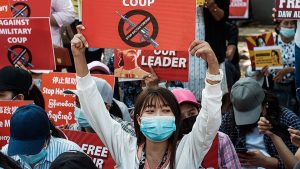Myanmar’s military government detained more writers, academics, and public intellectuals than any other country last year, as it sought ruthlessly to stamp out the resistance to its February 2021 coup.
According to PEN America’s latest Freedom to Write Index, released today, Myanmar’s junta detained at least 26 writers in 2021, and now sits third in the world behind only Saudi Arabia, which currently has 29 writers in detention, and perennial index-leader China, with 85.
“The environment for free expression in Myanmar dramatically worsened in 2021 as a result of the February 1 coup,” the report states. “In addition to detentions, which in most cases have been followed eventually by legal charges and sentences under Myanmar’s restrictive laws, writers and public intellectuals have also faced violence, threats, and surveillance, all of which have served to chill expression and the ability to write freely.”
The annual PEN index offers a count of the writers, academics, and public intellectuals who were held in prison or detention at some point during 2021. It includes any instance in which a writer was targeted because of their work, and jailed for more than 48 hours.
Globally, at least 277 writers were in prison or unjustly held in detention in connection with their writing, their work, or related activism, PEN said, up from 273 last year. In last year’s index, Myanmar was recorded as having eight writers and public intellectuals in detention, placing it in tenth position.
These figures are not surprising, given the ferocity of the Myanmar military’s crackdowns on dissenting opinions, but they offer further compelling evidence of the extent to which the country’s permitted spaces for free expression have contracted. As the report notes, the military’s crackdown has extended to “broad restrictions on free expression and the ability to access and share information and commentary, particularly online.”
“Widespread and lengthy internet and communications shutdowns, coupled with increased surveillance and the ramped up use of laws criminalizing online activity, were also used to silence influential voices,” it added.
This marks a sharp contrast with the situation just 15 months ago. During Myanmar’s anomalous decade of reform between 2011 and 2021, the government abolished the country’s system of “red pen” pre-publication censorship, and the press flourished after years under the heavy hand of military rule. New publications appeared by the dozen and academics, artists, and writers were emboldened to tackle issues that were once seen as politically untouchable.
When the military seized power on February 1 of last year, overthrowing the civilian government led by Aung San Suu Kyi and the National League for Democracy, writers, intellectuals, and filmmakers were among the most vocal critics. Writers’ groups and other creative artists also played an important role in the Civil Disobedience Movement that was formed in the immediate wake of the coup. As a result, they were “targeted for arrest and legal charges – and in some cases, they have been killed – for their civic activism and for inspiring others to join the movement.”
Others were arrested preemptively due to their long track records of support for democratic principles and opposition to military rule. Among these was Maung Thar Cho, a professor, poet, and political satirist who, according to PEN, was arrested just hours after the military coup and charged with spreading “false news.” He was subsequently sentenced to two years imprisonment with hard labor and, according to PEN, is currently being held in Insein Prison in Yangon, “undergoing periods of solitary confinement and denied access to adequate medical care.” Also arrested in the first hours after the coup were the filmmaker Min Htin Ko Ko Gyi, previously detained in 2019, the singer-songwriter Saw Phoe Khwar, and the writers Htin Lin Oo, Maung Thar Cho, Mya Aye, and Than Myint Aung.
As I’ve noted before, the junta has also targeted the press, detaining more than 100 journalists during its menacing crackdown on anti-coup protests. About half have since been released, but the advocacy group Reporters Without Borders claimed in December that 53 journalists are still in custody.
“In Myanmar and in countries across the globe, writers and public intellectuals are being imprisoned for the ‘crime’ of exercising their freedom of expression and, in many cases, for using the power of the written word to fight back against authoritarianism,” Karin Deutsch Karlekar, the director of PEN America’s “free expression at risk” program, told The Guardian in connection with the report’s release.

































